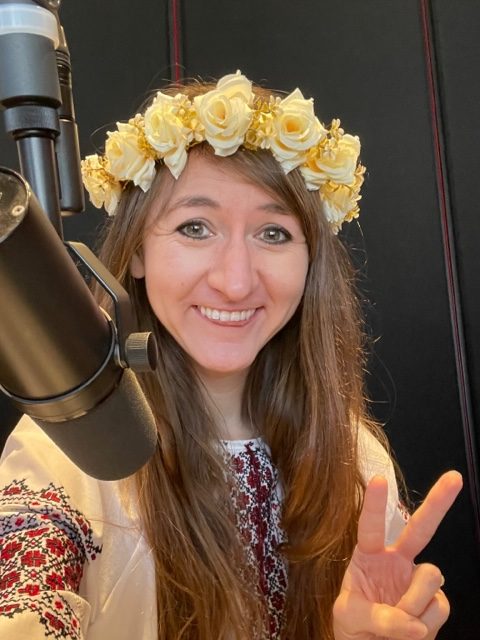
This week, community radio stations in the Pacifica Network will have access to a new show called Radiostoyevsky. Jaime Cordes is the host and creator. She says, “Radiostoyevsky introduces, curates, and celebrates music from Russia, the Balkans and everywhere in between…this show takes you on an entertaining musical journey through the culture, history, and the politics of this diverse and fascinating region of the world.”
Jaime sat down for an interview with Pacifica Network Manager Ursula Ruedenberg. They discussed Jaime’s attraction to Eastern Europe and Eurasia, the unique music that can be found there, and how artists in the region are responding to the war in Ukraine.
This interview has been edited for brevity and clarity.
Ursula
Could you describe a little bit about why you got into this type of music?
Jaime
Sure. I started studying Russian in college and then ended up living in Russia for about a year and a half. I was first in St. Petersburg for a study-abroad program in college in 2010 and then spent a year on a Fulbright Fellowship teaching English in Tula, a city just about three hours south of Moscow. I had been finding opportunities to go back, but it’s now been a while since I’ve been back to the country given the political developments in recent years and my current work.
Ursula Ruedenberg
What’s the work you do now?
Jaime
I work at an international nonprofit that supports independent
media around the world. My role specifically supports our work in Europe and Eurasia.
After I was in Russia, I began a master’s program in Eurasian and Eastern European studies in DC. Just before starting the program I went on a trip to Serbia to visit one of my family’s previous foreign exchange students and became really interested in the Balkans. This inspired me to focus my graduate studies more around the Western Balkans (typically the countries of the former Yugoslavia – Bosnia and Herzegovina, Croatia, Kosovo, Montenegro, North Macedonia, and Serbia, plus Albania and excluding Slovenia) and ended up taking a year off during my graduate program to study Serbian on a fellowship for a year in Belgrade.
Ursula Ruedenberg
What was it about the region that attracted you so much?
Jaime
In college, I initially just wanted to study a new language. I had studied German in high school, but had friends that were exchange students from Russia and Central Asia. I remember them teaching me a few words in Russian, like how to say thank you. And then I ended up having really amazing Russian professors in college and fell in love with the literature. I was also fascinated by Soviet history. Then, when I actually studied abroad, I fell in love even more. St. Petersburg is a beautiful city. When I was there, it felt like the country was starting to open up a bit more, but now it feels uncertain when or if it may ever be possible for me to go back.
For the Balkans, it was all kinds of things. Our former exchange student took me to his hometown, Vrnjacka Banja, and I remember being amazed at how beautiful it was. I thought the whole city looked like a park. His family was also extremely hospitable, feeding me mountains of delicious food. I think the part that intrigued me most was that after I had lived in Russia and gotten fairly comfortable with the language, I could kind of pick out some words in Serbian since it is also a Slavic language. It gave me the idea that I could maybe learn Serbian as well. And when I was in Belgrade, I remember my exchange student pointing out different things as we drove through the city, sometimes saying things like, ‘oh, and this is the building where you bombed us,’ talking about the NATO bombing in the late 90s. At that point, I realized that even though we were the same age, I actually knew very little about the wars that happened there during both of our lifetimes and about the Balkans itself. This made me want to invest more time into learning about the region when I went back to the States to start grad school.
But I also really love music. And just by spending some time living in the region, I developed a solid foundation of knowledge about the great local artists that are making music there. For the Balkans, that went from really specific-to-the-region genres like turbo folk onto types of music I was more familiar with like the really great indie alternative scene in the region. And each country in the region has their own unique musical traditions and trends. During grad school, these were all the countries that I was studying and learning about, and they are now the focus of my current work. So following music from the region has always been a way for me to stay more personally connected to it, outside of just following it through my work and the news.

Ursula Ruedenberg
So how do you keep up with the music in the area?
Jaime
I have an extensive list of browser bookmarks from different blogs about music from the various countries in the region. I’m regularly looking at these different music blogs to discover new music from the region. Now, all of my social media algorithms also understand what I’m looking for. So playlists created for me by streaming platforms, like Apple Music, now recommend songs for me that are from the region. Every year on my show, I also explore the nominees from music awards shows in the region, the local artists in the lineups of music festivals in the region, and the artists competing for Eurovision. This also helps me to discover new artists. Of course, I also have my favorite artists from the region that I’m always following.
Ursula Ruedenberg
So obviously, the war in Ukraine is a big uproar in the area, do you see that showing up in the local music?
Jaime
Yeah, absolutely. I feel like a lot of the songs that are being written today, especially by Ukrainian artists, are trying to motivate people not to give up the fight. There are also some that specifically reference current events. Artists from other countries in the region beyond Ukraine have also written songs with lyrics that are clearly in solidarity with the Ukrainian people. The situation with Russia is more complicated. Russia as a whole has kind of been “canceled” on an international scale since the start of the war (and for good reason), but this also affects Russian artists that don’t support the war. A number of Russian artists vocal about their opposition to the war have actually left the country. For others that remain, it’s dangerous to express any views that could be seen as critical of the authorities. I think now many Russian artists are losing opportunities for promotion because of the current international stigma.
Ursula Ruedenberg
How do you conceptualize your show? Do you talk in the show about certain issues or what the music means?
Jaime
Each show usually has a specific theme. A lot of times they’re just silly themes like songs about animals or rainy days or they focus on a certain musical genre or a particular country in the region. I do introduce every song on the show though and I try to do a decent amount of research on the artists and their music before featuring them on the program. I typically look at the lyrics of all the songs I feature, although it’s easier for me to interpret if they’re in Bosnian/Serbian/Croatian or Russian since those are the languages I’m most familiar with. But Google Translate helps a lot with the other ones. Sometimes my programs are inspired by current events in the region and, in that case, I will try to give background on how the song or artist is connected to the particular event. For example, I did one show of all Belarusian music soon after the start of protests against the government of Belarus following unfair presidential elections in August 2020. A number of the songs I featured were either inspired by the protests themselves or ones that could be heard at local rallies to motivate those demonstrating.
Ursula Ruedenberg
So you do look, in particular, for songs that talk about freedom or democracy? Or how big of a role does that play in your choice of music?
Jaime
I think I like to keep the show a little bit lighter. So I don’t necessarily look out for songs about those topics. I love it when I do find out that the song has a deeper meaning. But sometimes I think you also just need some music that you enjoy, and you can relax too. In my job, I sometimes get overly consumed in all the negative developments happening in the region. So oftentimes my program actually helps me to step away from that and reconnect with the things that made me fall in love with the region and its people.
Ursula Ruedenberg
What connected you with Pacifica Network?
Jaime
Lynn Borton. She used to produce her program at the same community radio station in Arlington, where I used to volunteer/produce my program. She reached out and told me about the Pacifica Network, and recommended that I check it out given her positive experience syndicating her show Choose to Be Curious on AudioPort.
Ursula Ruedenberg
So the word of mouth is working?
Jaime
Yeah, absolutely
Ursula Ruedenberg
That’s great. So I guess to wrap up, why should somebody take your show?
Jaime
A station or someone that took my show would bring a new type of music to their listeners that you wouldn’t normally hear on mainstream radio. Even though, I think, a lot of it is so catchy that it could be on mainstream radio! It’s just not in English. It could also be a good show for reaching out to diaspora communities from the region, or people that may have friends or family from the region. Or for people like me that are studying languages from the region or just have a specific interest. Part of the reason that I started the show is because I myself was looking for something like it, and couldn’t find anything that was quite focused on this particular region. I was able to find lots of world music shows, but none that were specifically focusing on the countries that I was most interested in. So I hope that there are other people out there like me that are curious about exploring music from the region and would find it interesting.
Music fans can find Radiostoyevsky episodes here.
Pacifica Network radio stations can find Radiostoyevsky in the AudioPort database.
